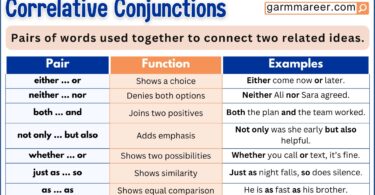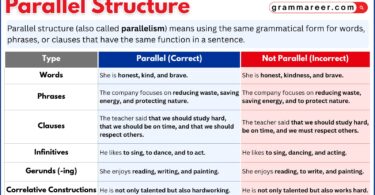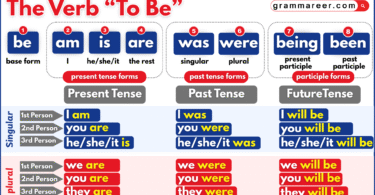Sometimes, when students see words like unbelievable or kindness, the main meaning feels hidden because a small beginning or ending has been added. Prefixes and Suffixes are letter groups that attach to a base word to shape how the meaning develops. A prefix comes before the base, as in rewrite meaning to do again, while a suffix comes after the base, as in writer meaning a person who writes. When we learn to notice these parts, longer words become easier to understand and work with calmly.
In this post, I teach Prefixes and Suffixes through steady examples that you can apply in your own vocabulary use. We will move step by step, noticing how each added part influences meaning and expression. Take your time, look closely at each example, and let your familiarity grow through patient practice.
Table of Contents
What Are Prefixes and Suffixes in English?
Prefixes and suffixes are small word parts added to other words to change their meaning.
What is a Prefix?
A prefix is a group of letters added to the beginning of a word. It changes the meaning of the word.
Example:
re + write = rewrite (means to write again)
un + kind = unkind (means not kind)
What is a Suffix?
A suffix is a group of letters added to the end of a word. It changes the word’s form or meaning.
Example:
help + ful = helpful (means full of help)
act + or = actor (means a person who acts)
Suffixes help us know what type of word it is—like a person, action, or description.
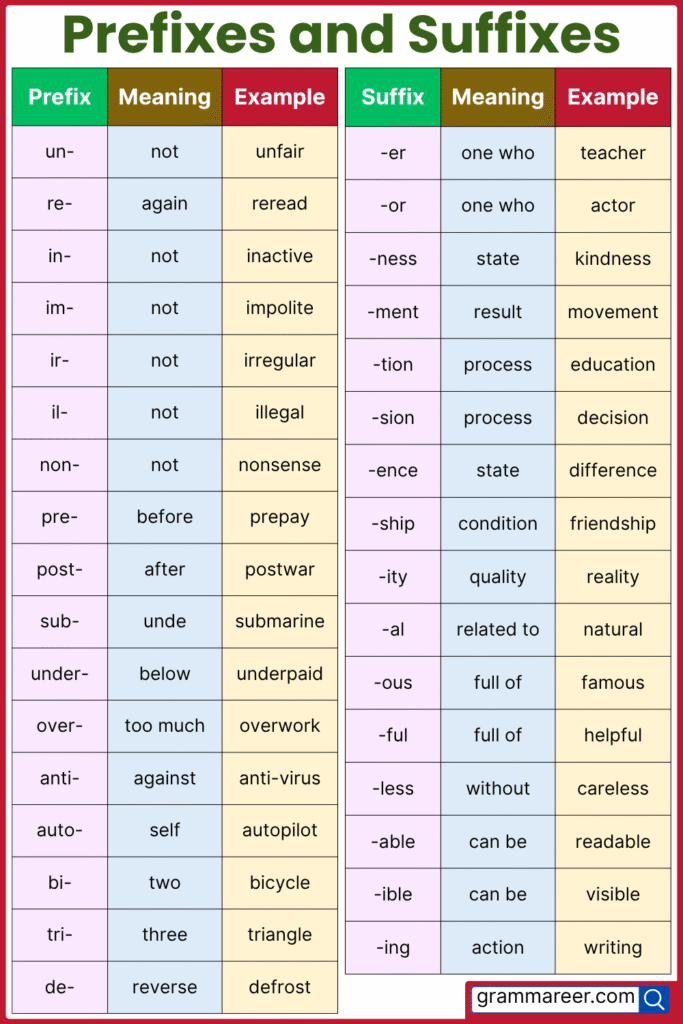
Common Prefixes in English with Meanings
Prefixes are small word parts placed before a root word. They change the word’s meaning. Below is a list of widely used prefixes, their meanings, and example words.
| Prefix | Meaning | Example Word |
|---|---|---|
| un– | not | unfair |
| re- | again | reread |
| dis- | not / opposite of | disconnect |
| in- | not | inactive |
| im- | not | impolite |
| ir- | not | irregular |
| il- | not | illegal |
| non- | not | nonsense |
| pre– | before | prepay |
| post- | after | postwar |
| inter- | between / among | international |
| sub- | under / below | submarine |
| super- | above / beyond | superman |
| under- | too little / below | underpaid |
| over- | too much / above | overwork |
| mis- | wrongly / badly | misunderstand |
| anti- | against | anti-virus |
| auto- | self | autopilot |
| bi- | two | bicycle |
| tri- | three | triangle |
| mono- | one / single | monologue |
| multi- | many | multicultural |
| trans- | across / through | transport |
| co- | together / with | cooperate |
| ex- | former / out of | ex-president |
| pro- | for / forward | promote |
| en- | cause to / put into | enable |
| semi- | half / partly | semicircle |
| de- | reverse / remove / down | defrost |
Common Suffixes in English with Meanings
Suffixes are letter groups added to the end of a word to change its meaning or word type (like noun, verb, adjective). Learning suffixes helps you understand how words work in sentences.
Below is a list of common English suffixes, with their meanings and examples in simple English:
| Suffix | Meaning | Example |
|---|---|---|
| -er | person who does | teacher |
| -or | person who does | actor |
| -ist | practices something | artist |
| -ian | related to something | musician |
| -ness | state or quality | kindness |
| -ment | action or result | movement |
| -tion | action or process | education |
| -sion | action or condition | decision |
| -ance | state or quality | importance |
| -ence | state or quality | difference |
| -ship | state or condition | friendship |
| -ity | quality or condition | reality |
| -al | relating to | natural |
| -ous | full of | famous |
| -ful | full of | helpful |
| -less | without | careless |
| -able | can be done | readable |
| -ible | can be done | visible |
| -ing | action or process | writing |
| -ed | past tense | played |
| -ly | in a certain way | quickly |
| -y | full of / having | sunny |
| -en | made of / become | golden |
| -ive | nature of | creative |
| -ward | direction of | forward |
100 Prefixes and Suffixes Words List
Here is a complete 100 Prefix and Suffix Words List in English, thoughtfully divided into 50 prefix-based words and 50 suffix-based words. Each entry includes the base word, the prefix or suffix applied, and the new word formed—clearly showing how word parts can transform meaning or function.
50 Prefixes Words List
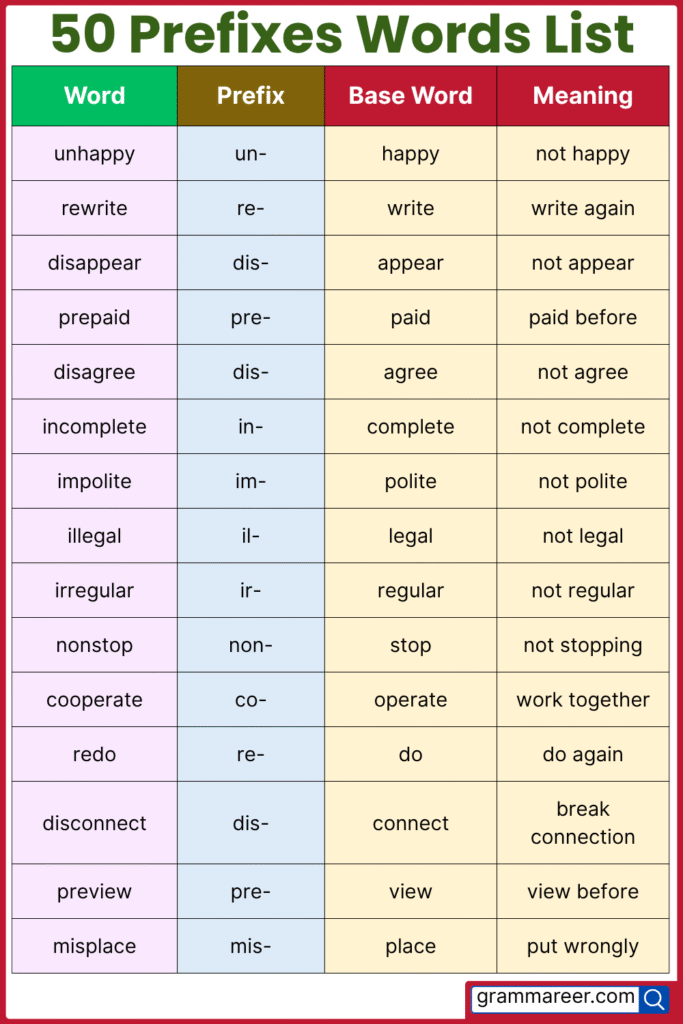
| Prefix Word | Prefix | Meaning |
|---|---|---|
| unhappy | un- | not happy |
| rewrite | re- | write again |
| disappear | dis- | not appear |
| prepaid | pre- | paid before |
| disagree | dis- | not agree |
| incomplete | in- | not complete |
| impolite | im- | not polite |
| illegal | il- | not legal |
| irregular | ir- | not regular |
| nonstop | non- | not stopping |
| postwar | post- | after war |
| interact | inter- | act between |
| submarine | sub- | under the sea |
| overcook | over- | cook too much |
| underpaid | under- | paid too little |
| mislead | mis- | lead wrongly |
| antivirus | anti- | against virus |
| autopilot | auto- | controls itself |
| bicycle | bi- | two wheels |
| triangle | tri- | three angles |
| monologue | mono- | speech by one person |
| multicultural | multi- | many cultures |
| transport | trans- | move across |
| cooperate | co- | work together |
| ex-president | ex- | former president |
| promote | pro- | move forward |
| enable | en- | make able |
| semicircle | semi- | half circle |
| defrost | de- | remove frost |
| outgrow | out- | grow beyond |
| foresight | fore- | seeing ahead |
| undo | un- | reverse action |
| redo | re- | do again |
| disconnect | dis- | break connection |
| preview | pre- | view before |
| misplace | mis- | put wrongly |
| income | in- | come in |
| subzero | sub- | below zero |
| oversleep | over- | sleep too long |
| underweight | under- | too little weight |
| autobiography | auto- | life story by oneself |
| intersect | inter- | cut between |
| bimonthly | bi- | every two months |
| trilogy | tri- | set of three stories |
| exhale | ex- | breathe out |
| forecast | fore- | guess before |
| outpatient | out- | not admitted |
| decode | de- | unlock meaning |
| proeducation | pro- | support education |
| coworker | co- | workmate |
50 Suffixes Words List
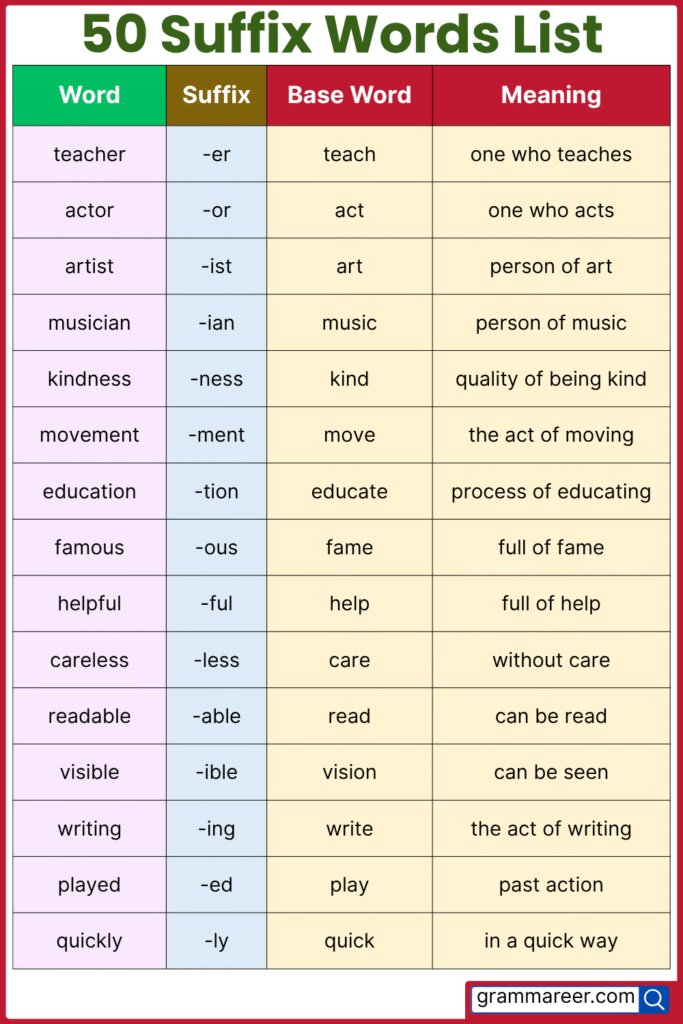
| Suffix Word | Suffix | Meaning |
|---|---|---|
| teacher | -er | one who teaches |
| actor | -or | one who acts |
| artist | -ist | person of art |
| musician | -ian | person of music |
| kindness | -ness | quality of being kind |
| movement | -ment | the act of moving |
| education | -tion | process of educating |
| decision | -sion | result of deciding |
| importance | -ance | state of being important |
| difference | -ence | quality of being different |
| friendship | -ship | state of being friends |
| reality | -ity | condition of being real |
| natural | -al | related to nature |
| famous | -ous | full of fame |
| helpful | -ful | full of help |
| careless | -less | without care |
| readable | -able | can be read |
| visible | -ible | can be seen |
| writing | -ing | the act of writing |
| played | -ed | past action |
| quickly | -ly | in a quick way |
| sunny | -y | full of sun |
| golden | -en | made of gold |
| creative | -ive | having creativity |
| forward | -ward | in the front direction |
| excitement | -ment | result of excitement |
| beautiful | -ful | full of beauty |
| priceless | -less | without price |
| singer | -er | one who sings |
| director | -or | one who directs |
| scientist | -ist | expert in science |
| librarian | -ian | person in library |
| happiness | -ness | state of being happy |
| creation | -tion | act of creating |
| confusion | -sion | state of being confused |
| brilliance | -ance | quality of being brilliant |
| silence | -ence | state of being silent |
| leadership | -ship | quality of leading |
| possibility | -ity | condition of being possible |
| cultural | -al | related to culture |
| generous | -ous | full of generosity |
| doubtful | -ful | full of doubt |
| hopeless | -less | without hope |
| lovable | -able | can be loved |
| incredible | -ible | hard to believe |
| dancing | -ing | the act of dancing |
| cleaned | -ed | past of clean |
| slowly | -ly | in a slow manner |
| tasty | -y | full of taste |
| wooden | -en | made of wood |
| talkative | -ive | likes to talk a lot |
How to Identify Prefixes and Suffixes in a Word
To identify them:
- Look at the beginning of the word.
If you see a part like un-, re-, pre-, dis-, it is a prefix.
👉 Example: unhappy → “un-” is the prefix. - Look at the end of the word.
If it ends with -ful, -ness, -ly, -ing, it is a suffix.
👉 Example: happiness → “-ness” is the suffix. - Find the base/root word.
Remove the prefix or suffix and check if the word still makes sense.
👉 Kindness → Remove “-ness” → kind (real word) - Ask yourself:
- Does this part change the meaning? (Prefix)
- Does this part change the type of word? (Suffix)
📌 Tip: Most long or new words have either a prefix, a suffix, or both!
Why Learn Prefixes and Suffixes?
Learning prefixes and suffixes helps you understand how English words are built, changed, and used. Instead of memorizing thousands of words, you can break them into parts to find their meaning. Prefixes often change the meaning of a word (like “un-” means not), while suffixes change the form or role of a word (like “-er” turns a verb into a person).
FAQs About Prefixes and Suffixes
A prefix is a group of letters added at the beginning of a word to change its meaning. Example: “re-” in rewrite.
A suffix is a group of letters added at the end of a word to change its form or function. Example: “-ful” in helpful.
Yes, some words have both. Example: unhappiness — “un-” is a prefix, “-ness” is a suffix.
They help learners understand meanings, build vocabulary, and recognize word families quickly.
Start with common ones (like un-, re-, -ing, -ed) and practice using them in simple words and sentences.
You May Also Like


